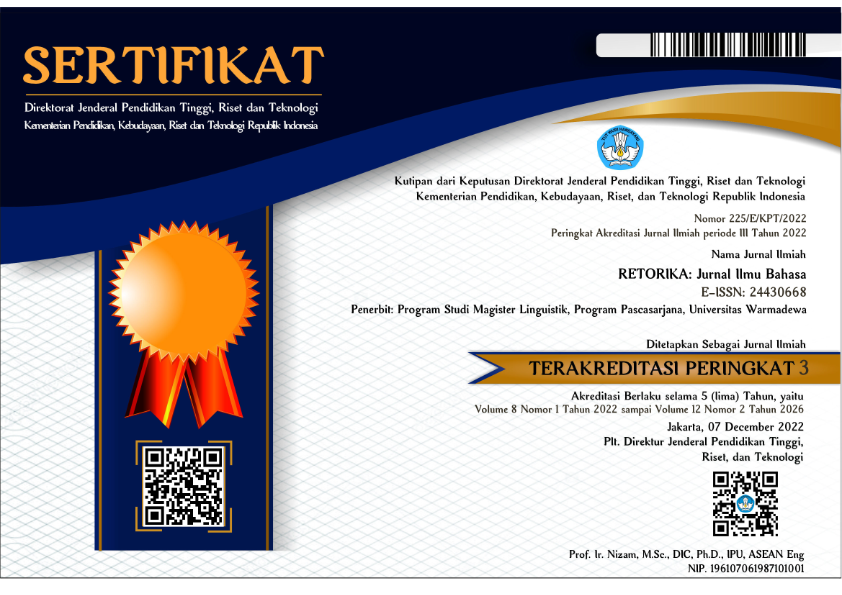Traditional Madurese Engagement Amids the Social Change of the Kangean Society
Abstract
Kangean is an island that has various traditions, one of which is the engagement tradition. Today, the engagement tradition has undergone a drastic shift, due to the presence of technological media, such as television, cell phones, the internet, and the like. Television, which is basically a medium of entertainment for the wider community, however, for the kangean community, television is one of the causes of social and cultural changes. This study aims to uncover and describe the causes of these changes. This study uses data analysis. Qualitative methods are methods that aim to obtain descriptive data. The data in this study are conversations related to the causes of socio-cultural shifts, the data is transcribed into written texts. The data was collected by interviewing, selecting, describing and verification techniques. Data were analyzed by using descriptive qualitative method which is based on Siswantoro's theory. The results of this study indicate that non-educational shows on television such as soap opera films, promiscuty, blue film, tiktok, life style, speaking style and dress patterns are greatly affect the kangean community especially among teenagers. The negative affects for Kangean teenagers are on social life, lifestyle, speaking style, promiscuty, drug addicts, violating customs, traditions and culture. Therefore, policies are needed to limit the scope of globalization to which ones should be implemented and which should be rejected. This requires the role of the government of the kangean community to act through policies that are more directed at socio-cultural considerations.
References
Alam, B. (1997). Globalisasi dan Perubahan Budaya: Perspektif Teori Kebudayaan. Jurnal Antropologi Indonesia, 0(54).
Anselm, S., & Corbin, J. (2003). Dasar-dasar Penelitian Kualitatif. Yogyakarta: Pustaka Belajar.
Keesing, R. M. (1974). Theories of Culture. Annual Review of Anthropology, 3.
Koentjaraningrat. (1985). Introduction to Anthropology. Jakarta: New Script.
Krisna. (2005). The Influence of Globalization on Human Cultural Pluralism in Developing Countries. Internet.
Moleong, L. (2000). Qualitative Research Methods. Bandung: PT Remaja Rosdakarya.
Muta’allim. (2019). Use and Function of Adjectives in Madurese Kangean Dialect. Jember: Jember University.
Muta’allim, & et al. (2020). The Superlative Adjective of Madurese Kangean Dialect: A Pragmatic Study. Lexema: Journal of Language and Literature, 5(1).
Sahlins, M. (1994). Goodbye to Tristes Tropique: Ethnography in the Context of Modern World History. In R. Borofsky (Ed.), Assessing Cultural Anthropology. New York: McGraw-Hill, Inc.
Siswantoro. (2010). Literary Research Methods, Poetry Structure Analysis. Yogyakarta: Student Library.
Soegianto. (1996). Madurese Kangean people and their language. (unpublished research). Jember University.
Suparlan, P. (1986). Culture and Development. IKA Media, 14.
Copyright (c) 2021 RETORIKA: Jurnal Ilmu Bahasa

This work is licensed under a Creative Commons Attribution-ShareAlike 4.0 International License.
This journal provides immediate open access to its content on the principle that making research freely available to the public supports a greater global exchange of knowledge.
All articles published Open Access will be immediately and permanently free for everyone to read and download. We are continuously working with our author communities to select the best choice of license options, currently being defined for this journal as follows: Creative Commons-Non Ceomercial-Attribution-ShareAlike (CC BY-NC-SA)
 Abstract viewed = 378 times
Abstract viewed = 378 times
 PDF downloaded = 361 times
PDF downloaded = 361 times

2.png)














